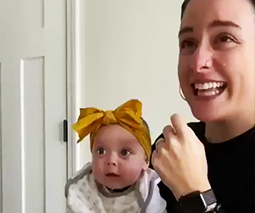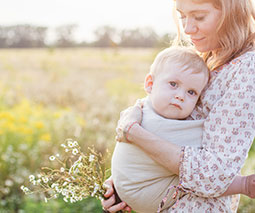Is my baby overstimulated? Learn how to read the signs

Your baby’s first year is full of so much play and exploration, but sometimes all the action can add up to overstimulation, and a rather cranky baby. Here are some of the warning signs, and ideas for downtime.
What is overstimulation?
It’s basically when a baby gets overwhelmed by sounds, sensations, and experiences. So for example, you might have a lot of people over to see your new baby – everything’s great, bub is loving all the cuddles, but when everyone leaves your child unravels.
Even though babies are hardwired to seek out love and attention from us adoring adults, they do have a tipping point where they also require space and time alone. Unfortunately babies can’t communicate this to us, so all we can do is look out for the signs that they’re not coping, and require some quiet time in a calm environment.
Signs of overstimulation
Here’s what you might notice in your newborn or infant:
Increased crying
It might be a slow escalation of cries, or an all-out red-faced crying fit, but often inconsolable crying can indicate that your baby is feeling overstimulated and just can’t wind down.
Jerky moves
You might notice your baby’s movements get a lot more choppy and confused, or they start ramping up and moving around very quickly.
The head turn
Your baby starts looking away from you when you try to engage with them. They seem distracted and unable to focus in their normal way.
Flying limbs
Some infants will start to clench their fists, kick, and wave their arms about.
Faster breathing
Just like adults, a baby’s breathing can speed up when they get excited or tired. Keep an eye out for changes in your baby’s breathing patterns.
Typical situations that might overstimulate
Every baby’s different, but there are some situations that can overwhelm infants, such as:
- When they’ve had a lot of play time and they’re feeling tired.
- When they’re out of their usual feed, play, sleep routine.
- When they’ve been handled by a lot of people.
- When they’re sick, or going through a growth spurt.
How to help your baby calm down
Seek refuge
When you see the signs of overstimulation, take your baby somewhere calm and quiet. That could be her bedroom or cot if you’re home, or if you’re out – try covering the pram and moving it away from the action.
Swaddle
Wrapping babies can really help them feel safe and secure. You could try swaddling your baby in a wrap, or popping them in a sling or carrier to help reduce overwhelming physical sensations.
Stay relaxed
Changing your own body language can help send cues to your baby that it’s time to relax. Try slowing down, dropping your shoulders, and lowering your voice.
Get them comfortable
Check that all your baby’s physical needs have been met – ie; they’ve been fed, dry nappy, comfortable clothes. Then prepare them for sleep as you normally would.
Return to the routine
Sometimes we have to deviate from the routine, but if baby is starting to get sensory overload from the changes, try to get back to your regular routine when you can. Having that consistent cycle of sleeping, feeding and playing, helps your baby feel safe and calm.
How to limit visitors
As much as we love showing off the new baby, an influx of visitors can really wreak havoc with routine, so just have a think about how you can control the visits.
It’s perfectly reasonable to set time limits on visits (one hour is plenty guys!), or getting out and visiting people can give you the power to leave when you want. If all else fails, speak up for your baby. When you see that they’re getting overstimulated, let your visitors know, and wrap it up.









